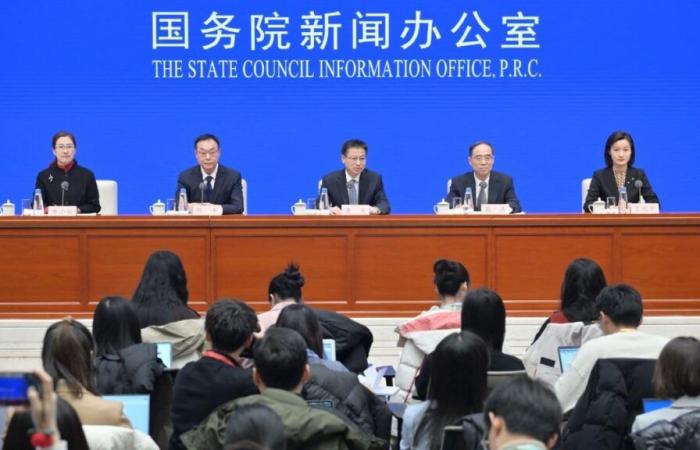Fifteen years ago, China experienced an annual economic growth rate of more than 10%. In 2024, that time seems far away. Just like the previous year, growth will be around 5% and we are not seeing any real recovery in the Chinese economy. Household consumption expenditure remains weak. For three decades, their savings were almost exclusively focused on real estate due to a lack of other possible investment offers, so much so that a real estate bubble formed when the sector slowed down sharply, due to a lack of buyers.
Furthermore, the demographic decline, a consequence of the long period when couples were only allowed to have one child, is beginning to result in a drop in the number of people entering the labor market, where jobs are not available. are not as numerous as before. If Chinese exports continue to be important, the arrival of Donald Trump at the White House on January 20 must also be accompanied by an increase in American customs duties on Chinese imports.
Subscribe to the Slate newsletter for free!Articles are selected for you, based on your interests, every day in your mailbox.
Faced with this situation, on December 15 and 16, at the annual central conference on economic work chaired by Xi Jinping, the country's leaders declared “make economic stability a top priority”. The meeting participants admitted that “the foundations of economic recovery have not been stabilized”while adding that in 2025, “the country will focus on stimulating domestic demand by prioritizing recovery and expansion of consumption”.
Distrust of Western functioning
For two years, the Chinese government has periodically initiated budgetary measures to revive the economy. In addition, for 2025, Treasury bonds will be issued for an amount of 3,000 billion yuan (395.57 billion euros). The Chinese government has never initiated such debt. The revenue from these bonds is intended to fight against the deflation plaguing China and to stimulate consumption.
For this, subsidy programs are planned in order to modernize all kinds of equipment and invest in “new productive forces”namely robotics, electric vehicles, semiconductors or solar panels. At the same time, part of the money that these Treasury bonds will bring in must make it possible to recapitalize the large state banks, whose margins and profits are currently in sharp decline.
China has no shortage of economic experts to prepare and then manage the directives decided by the highest levels of the government and the Chinese Communist Party. Throughout the last fifty years, Chinese leaders have acquired real experience in economic management. After the phase of Maoism, where China, cut off from the world, had engaged in hazardous economic initiatives, Deng Xiaoping launched, from 1978, important reforms which made it possible to both reduce the intervention of the State and open the country to global markets. This policy was reinforced when, in 1991, Deng announced that he was “good to get rich” and that this message was perfectly understood by more than a third of the Chinese population. In this context, in 2001, China was admitted to the World Trade Organization (WTO) and then, in 2008, it began to participate in the G20 summits.
If, during this period, China's trade continued to develop throughout the world, the country's financial system remained tightly controlled by the Communist Party. Jean-François di Meglio, president of the Asia Centre, remembers: “Most Western economists thought that after entering the WTO, China would deregulate its economy in order to become more efficient. But that's not at all what happened. Every time a liberal WTO rule was to apply, Chinese leaders put in place a Chinese-style rule. China has never allowed free competition between foreign and domestic economic players.”
However, since 2010, the Chinese economy has become the second largest economic and commercial power on the planet, after the United States. In 2014, China's GDP (gross domestic product) was 3.5 times larger than in 2000, with an annual increase of 7.7%. World trade was driven by China's weight and influence, and it appeared that it would soon surpass the might of the American economy.
At the same time, in 2008, when the subprime crisis caused severe turmoil in the United States, China began to distrust the functioning of the Western economy. Xi Jinping and his entourage, who came to power in 2012, believe that it is better not to be inspired by this management model. Therefore, the priority for China is to continue its modernization. While welcoming the “resounding successes» of the country's economic development, the Communist Party explains that the moral education of Chinese citizens “is not at all the same height”.
If the Party wants to remain in place, it is necessary, as soon as possible, to reform the Chinese political, cultural and educational system in order to maintain surveillance of the population and above all to avoid a development leading to a collapse comparable to that of the USSR after Mikhail Gorbachev's perestroika (reconstruction). While the Chinese regime has these priorities in mind, a slowdown in growth appears from 2017 and worsens from 2020 to 2022 due to the confinement imposed on the country by the Covid-19 epidemic, followed by the absence current economic recovery.
Stop personal enrichment
Faced with these difficulties, the Chinese government considers today that it is essential not to liberalize the way the economy operates but, on the contrary, to strengthen its control by giving more weight to the public sector. Companies that belong to this area are over-indebted and rarely productive, but it is to them that public loans should be granted. At the same time, the search for individual profit is strongly questioned. The managers of large public banks are particularly asked to comply with the march towards “common prosperity”a goal put forward in 2021 by Xi Jinping and which is synonymous with the fight against inequalities.
From then on, the best possible salaries for the managers of large Chinese banks can no longer exceed the equivalent of 380,000 euros per year. Staff had to accept both salary cuts of around 25% and the abolition of the practice of bonuses. In several cities, some banks have deemed it prudent to leave their luxurious premises and move into more modest buildings.
Wang Bin, CEO of China Life Insurance Company, and Liu Liange, Chairman of Bank of China, received suspended death sentences.
To clearly show that power does not admit personal enrichment, the fight against corruption launched in 2012 by Xi Jinping has resumed with a vengeance in 2022, with investigations by the central commission for the inspection of Party discipline. communist triggers for “serious violations of discipline and the law”. The convictions particularly target senior public finance officials.
Wang Bin, who was the CEO of major insurance company China Life, was found guilty of accepting bribes worth 325 million yuan (42.8 million euros) and hiding illegally abroad 54.2 million yuan (7.1 million euros). Liu Liange, who was president of the Bank of China, one of the four main Chinese banks, was accused of having received the equivalent of 15 million euros in bribes against the granting of loans including the addition amounts to around 400 million euros. “These criminal acts are particularly serious and their social impact is extremely harmful”commented on Chinese television. However, it is specified that the accused “cooperated with investigators, helped return the majority of the misappropriated property and expressed remorse”.
Wang Bin, in September 2024, and Liu Liange, in November, were given suspended death sentences. If, for two years, they behave properly in prison, their sentence could be commuted to life imprisonment. Another corruption investigation is currently targeting the insurance company Ansheng Life Insurance, a subsidiary of the powerful bank ICBC (Industrial and Commercial Bank of China Ltd) and which, in China, is associated with the French insurance company AXA. Tao Zhongwei, who has been vice-president since 2021, is suspected of corruption.
The banking sector as a scapegoat
In all these cases, the Chinese political authorities make sure to give the written and television press as much detail as possible on the accusations and the ensuing convictions. The population should be informed of the efforts being made by those in power to clean up the country's economy. But this information does not go so far as to allow the slightest journalistic investigation into the veracity or otherwise of the accusations.
For Jean-François Di Meglio “The Chinese banking sector is the scapegoat for many problems. I don't think it's a more corrupt sector than others. But, and perhaps this is the reason for the current severity, there are profiles who have been more exposed to foreign culture. And if those in power attack the heads of finance, it is perhaps because that is where there is the most protest, not necessarily written or verbal, but potential, of the completely locked system which was implemented in China in the financial field.”
What is important for the Chinese Communist Party is to proclaim, as it did in a document published in 2023, that the banking sector must not adopt the mode of operation of “financial elitism, the cult of money, and reverence towards the West”. In January 2024, Xi Jinping insisted in a speech on the need for Chinese finance to be “different in nature from the Western mode of financial development”.
At the same time, one of China's objectives is to move upmarket as quickly as possible in high technologies, particularly in artificial intelligence and chips. In these areas, it is difficult to know where Chinese research is, but a trade conflict could arise with Donald Trump's America. Conversely, a US-Chinese deal, in which each of the two countries would agree to limit the other's industrial production on its territory, could also emerge. Which could even further lead China to dump its production into the rest of the world, and in particular towards Europe. So many perspectives to which, in Beijing, we will be particularly attentive in 2025.






